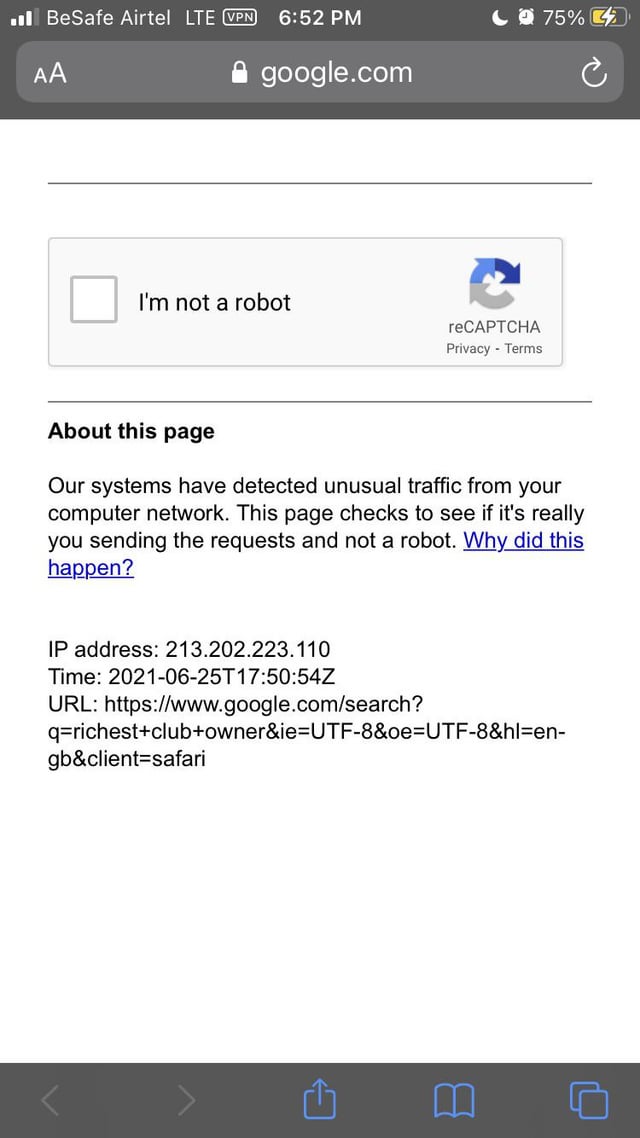Yes, reCAPTCHA works with VPNs, but it may trigger more verification challenges. This occurs because VPNs can mask your IP address, making it appear suspicious.
ReCAPTCHA is a widely used security tool designed to differentiate between humans and bots. It protects websites from spam and abuse by presenting challenges that require human interaction. Many users employ VPNs for privacy and security while browsing online. However, this can complicate their experience with reCAPTCHA.
VPNs often route traffic through various servers, which can lead to the system flagging users as potentially harmful. Understanding how reCAPTCHA interacts with VPNs is crucial for smooth online navigation. This knowledge helps users manage their browsing experience without unnecessary interruptions or security hurdles.

Credit: www.reddit.com
The Basics Of Recaptcha
reCAPTCHA is a security tool created by Google. It helps websites prevent bots from accessing their services. This tool verifies whether a user is human or a machine. Users often see challenges like clicking checkboxes or identifying images. These tasks are easy for humans but tough for bots.
How Recaptcha Keeps Websites Secure
reCAPTCHA protects websites in various ways:
- Bot Detection: It identifies automated scripts.
- Data Collection: It gathers data to improve accuracy.
- User Behavior Analysis: It tracks user interactions.
- Challenge-Response Tests: It presents tasks to confirm humanity.
These methods work together to block harmful activities. Websites can stop spam, fake registrations, and unauthorized access. reCAPTCHA also adapts to new threats, staying one step ahead.
The Evolution Of Recaptcha
reCAPTCHA has changed over the years. Here’s a brief timeline:
| Year | Version | Features |
|---|---|---|
| 2007 | Classic reCAPTCHA | Text-based challenges using scanned words. |
| 2014 | reCAPTCHA v2 | Checkbox “I’m not a robot” and image recognition. |
| 2018 | reCAPTCHA v3 | Works behind the scenes with scores for user actions. |
Each version offers improved security and user experience. The goal remains the same: protect websites from bots.

Credit: www.reddit.com
Understanding Vpns
A Virtual Private Network (VPN) offers privacy and security online. It creates a secure tunnel for your internet connection. This protects your data from hackers and snoopers. Many people use VPNs to access restricted content or browse anonymously.
The Core Function Of Vpns
VPNs serve several essential functions:
- Data Encryption: VPNs encrypt your data. This makes it unreadable to outsiders.
- IP Masking: Your real IP address is hidden. Websites see the VPN’s IP instead.
- Access to Restricted Content: VPNs let users access blocked websites.
- Secure Public Wi-Fi: VPNs protect your data on public networks.
Misconceptions About Vpns
Many myths surround VPNs. Understanding these can help you use them better.
| Myth | Truth |
|---|---|
| VPNs are only for tech experts. | VPNs are user-friendly for everyone. |
| VPNs are illegal. | VPNs are legal in most countries. |
| All VPNs are the same. | VPNs vary in features and security levels. |
| VPNs slow down your internet. | Good VPNs can maintain high speeds. |
These misconceptions can lead to confusion. Knowing the truth helps you choose the right VPN.
Recaptcha And Vpn: The Compatibility Question
Many users wonder how reCAPTCHA interacts with VPNs. Understanding this can help prevent access issues. Let’s explore why reCAPTCHA may flag VPN users and the effects of IP address rotation.
Why Recaptcha Might Flag Vpn Users
reCAPTCHA aims to protect websites from bots. It uses various signals to determine user authenticity. Here are some reasons why reCAPTCHA may flag VPN users:
- Shared IP Addresses: Many VPNs use shared IPs. This increases the chances of being flagged.
- Frequent IP Changes: Rapidly changing IPs can seem suspicious. This behavior raises red flags.
- Geolocation Mismatches: VPNs can mask true locations. This can cause inconsistencies in user data.
- Known VPN IP Ranges: Some IPs are recognized as VPNs. reCAPTCHA often blocks these addresses.
The Impact Of Ip Address Rotation
IP address rotation occurs when a VPN frequently changes your IP. This practice affects reCAPTCHA performance. Here’s how it impacts users:
| Impact | Description |
|---|---|
| Increased Captcha Challenges | Frequent IP changes lead to more captcha prompts. |
| Access Denials | Some users may be completely blocked from sites. |
| Frustrating User Experience | Repeated challenges can annoy legitimate users. |
To minimize issues, consider these tips:
- Use a reputable VPN known for stability.
- Connect to dedicated IP addresses if available.
- Limit frequent IP changes during usage.
Understanding these factors can help users navigate reCAPTCHA more effectively.
Debunking Common Myths
Many people have misconceptions about how reCAPTCHA interacts with VPNs. Let’s clarify these myths to better understand the technology.
Myth: Vpns Always Trigger Recaptcha
Some users believe that using a VPN will always activate reCAPTCHA. This isn’t entirely true. Here are key points to consider:
- Not all IP addresses from VPNs are flagged.
- Some websites may not recognize VPN traffic.
- reCAPTCHA uses various factors to assess risk.
While some VPN IPs may trigger reCAPTCHA, it is not a universal rule. Many users browse with VPNs without issues.
Myth: Recaptcha Is Ineffective With Vpn
Another common myth is that reCAPTCHA fails to work with VPNs. This is misleading. Here’s how reCAPTCHA operates:
| Factor | Effect on reCAPTCHA |
|---|---|
| IP Reputation | VPN IPs can be flagged or clean. |
| User Behavior | reCAPTCHA analyzes user interactions. |
| Browser Fingerprinting | It assesses browser and device details. |
reCAPTCHA remains effective even with VPNs. It adapts to various factors.
Understanding these myths helps users make informed choices. VPNs do not always trigger reCAPTCHA. Similarly, reCAPTCHA still works with VPNs.
The Reality Behind Recaptcha And Vpn Use
Understanding how reCAPTCHA interacts with VPN services is essential. Many users rely on VPNs for privacy. Yet, these tools can create challenges with reCAPTCHA systems. Let’s explore how this technology affects online experiences.
How Vpns Can Affect Recaptcha Performance
Using a VPN can change your IP address. This change impacts how reCAPTCHA identifies users. Here are key points to consider:
- IP Address Changes: VPNs provide new IP addresses.
- Geolocation Issues: Different regions may trigger more challenges.
- Traffic Patterns: High VPN traffic can raise suspicion.
These factors can lead to:
- More frequent verification challenges.
- Increased chances of being blocked.
For some users, reCAPTCHA may become frustrating. They might experience delays while browsing.
User Experiences And Variabilities
User experiences with reCAPTCHA on VPNs can vary widely. Some users report:
- Seamless browsing with minimal interruptions.
- Frequent captcha challenges, disrupting their access.
Factors influencing these experiences include:
| Factor | Impact on reCAPTCHA |
|---|---|
| VPN Provider | Some providers are recognized, reducing captcha prompts. |
| Server Load | High load can lead to more challenges. |
| Browsing Behavior | Unusual patterns trigger more verification. |
Users should experiment with different VPNs. Finding one that balances privacy and usability is essential.
Improving Your Experience With Recaptcha On Vpn
Using a VPN can trigger reCAPTCHA challenges. These challenges can interrupt your browsing experience. Understanding how to minimize these triggers can enhance your online activities. Here are some tips to improve your experience.
Tips For Minimizing Recaptcha Triggers
- Use a Static IP: A static IP reduces reCAPTCHA prompts.
- Avoid Free VPNs: Free VPNs often share IPs with many users.
- Clear Cookies Regularly: Clearing cookies can reset your browsing history.
- Limit Browser Extensions: Some extensions may trigger reCAPTCHA.
- Disable WebRTC: This can help protect your real IP address.
Choosing The Right Vpn For Better Compatibility
Selecting the right VPN can improve your reCAPTCHA experience. Consider the following factors:
| Factor | Description |
|---|---|
| Reputable Providers | Choose providers with a good reputation for privacy. |
| Server Locations | More server locations reduce the chance of IP blocks. |
| IP Rotation | Frequent IP changes can help avoid detection. |
| Customer Support | Reliable support can assist with reCAPTCHA issues. |
Picking the right VPN makes a significant difference. It can help you browse smoothly without interruptions.
The Future Of Online Security Measures
The landscape of online security is changing rapidly. As cyber threats evolve, so must the tools we use to protect ourselves. Understanding how tools like reCAPTCHA function with VPNs is crucial. This knowledge helps users stay safe online.
Innovations In Recaptcha Technology
reCAPTCHA has come a long way since its inception. It started as a simple text verification tool. Now, it uses advanced technologies like machine learning.
- Image Recognition: Users identify objects in images.
- Behavior Analysis: Tracks user behavior for authenticity.
- Invisible reCAPTCHA: Works in the background without user interaction.
These innovations make reCAPTCHA more effective against bots. They help ensure only real users access websites.
Evolving Standards For Vpns
VPN technology is not static. It continuously adapts to new challenges. VPNs are crucial for online privacy and security.
- Encryption: VPNs use strong encryption methods.
- Protocol Advancements: New protocols improve speed and security.
- Multi-Factor Authentication: Adds extra layers of security.
These advancements help users maintain their privacy online. They also impact how reCAPTCHA works. VPNs can sometimes trigger reCAPTCHA challenges.
| Feature | reCAPTCHA | VPN |
|---|---|---|
| Purpose | Prevent bots | Enhance privacy |
| Technology | Machine Learning | Encryption Protocols |
| User Interaction | Varies | Minimal |
Understanding these features helps users navigate online security better. Awareness allows users to protect their data effectively.
Credit: support.intego.com
Frequently Asked Questions
Does Vpn Affect Recaptcha Functionality?
Yes, using a VPN can impact Recaptcha. It may trigger additional challenges due to perceived anonymity. This can happen because Recaptcha assesses the IP address used. A shared IP from a VPN may seem suspicious, prompting more verification steps.
Why Is Recaptcha Failing On My Vpn?
Recaptcha may fail on a VPN due to IP address reputation. If the VPN’s IP is flagged for suspicious activity, Recaptcha may not function properly. Additionally, it might require more verification challenges to ensure user authenticity. Switching to a different server might resolve this issue.
Can I Bypass Recaptcha With A Vpn?
Bypassing Recaptcha with a VPN isn’t reliable. While some users attempt this, Recaptcha’s algorithms are designed to detect suspicious behavior. This means that using a VPN may actually increase the likelihood of additional challenges. It’s best to use a stable, reputable IP.
Is Recaptcha More Challenging On Vpns?
Yes, Recaptcha can be more challenging on VPNs. This is due to the nature of shared IP addresses used by many VPN services. Such addresses may have been previously flagged, leading to stricter checks. Users may experience increased verification steps as a result.
Conclusion
Recaptcha can work on VPNs, but results vary. Some users may face challenges, while others experience no issues. Factors like the VPN server’s IP reputation and browser settings play a role. Understanding these elements can help you navigate Recaptcha effectively.
Always choose a reliable VPN for the best experience.


0 comments